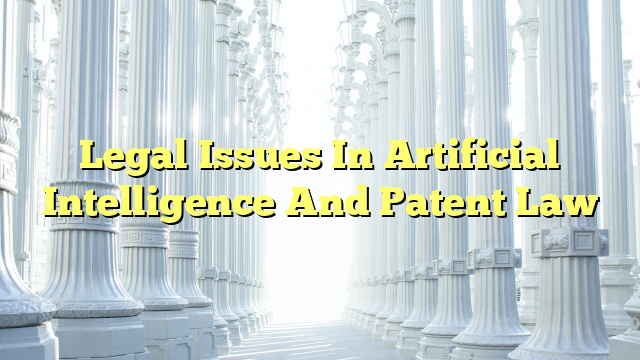Table of Contents
- What are the legal issues with artificial intelligence?
- Will patent attorneys be replaced by AI?
- What is the real role of AI in patent law debates?
- How has artificial intelligence impacted copyright law?
What are the legal issues with artificial intelligence?
Legal issues related to artificial intelligence (AI) are complex and often involve ethical considerations. AI is a rapidly evolving technology that has the potential to drastically alter the economic and social landscape of the world. With this potential, come a variety of legal risks. AI raises a number of questions, including the potential for data privacy breaches and the potential for AI-driven decisions to be discriminatory or unethical.
One of the most pressing legal issues with AI is the potential for data privacy breaches. AI systems are often collecting and processing vast amounts of data, which can potentially be used to identify individuals or uncover personal information. This raises the risk of data breaches, which can lead to costly financial and reputational damage. In addition, AI systems can be used to gain an unfair advantage in the market by exploiting data for competitive advantage.
Another important legal issue with AI is the potential for AI-driven decisions to be discriminatory or unethical. AI systems are often used to make automated decisions, such as in hiring or lending. These decisions can be based on algorithms that have been trained on biased data, leading to discriminatory outcomes. In addition, AI systems can be used to manipulate people or to make decisions that may be unethical.
Finally, legal issues related to AI can arise from the potential for AI systems to create new forms of intellectual property. AI systems can be used to generate works of art, music, and literature, raising questions as to who owns the rights to such works.
Will patent attorneys be replaced by AI?
It is unlikely that patent attorneys will be replaced by AI in the near future, as patent law is highly complex and requires a deep understanding of the legal and technical aspects of inventions. AI systems can be used to automate certain parts of the patent process, such as searching existing patents and analyzing patent claims. However, patent law requires a nuanced knowledge of the legal and technical aspects of inventions, which is not something AI systems can currently provide.
That said, AI systems have the potential to play an increasingly important role in patent law. AI systems can be used to automate certain parts of the patent process, such as searching existing patents and analyzing patent claims. These systems can also be used to identify potential patent infringement, which can help companies protect their intellectual property. In addition, AI systems can be used to identify new trends in patent law, which can be useful for patent attorneys when advising clients.
What is the real role of AI in patent law debates?
The role of AI in patent law debates is to provide a more efficient and accurate way of assessing patent claims and identifying potential infringement. AI systems can automate certain aspects of the patent process, such as searching existing patents and analyzing patent claims. This can help to reduce the time and cost associated with analyzing patent applications. In addition, AI systems can be used to identify trends in patent law, which can be useful for patent attorneys when advising clients.
The real role of AI in patent law debates is to provide an additional layer of analysis that can help patent attorneys and businesses make informed decisions. AI systems can provide insight into the legal and technical aspects of inventions, which can be used to inform patent strategy and identify potential infringement. However, AI systems cannot replace the expertise of experienced patent attorneys, as patent law is highly complex and requires a deep understanding of the legal and technical aspects of inventions.
How has artificial intelligence impacted copyright law?
AI has had a significant impact on copyright law, as AI systems can be used to generate works of art, music, and literature. This raises questions as to who owns the rights to such works. In many jurisdictions, works created by AI systems are protected by copyright law, with the copyright holder being the creator of the AI system. This has led to an increased focus on the rights of AI creators, as well as the potential for copyright infringement when AI systems are used to generate works.
In addition, AI has impacted copyright

